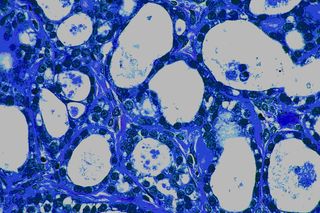
Large‑Scale Study Links PCOS to Mental Health Problems
The anxiety after a diagnosis is real.

A new large-scale study of 17,000 women diagnosed with PCOS in the UK shows a clear link between a polycystic ovary syndrome diagnosis and mental health problems.
However, researchers are quick to note the link is not causative; the biological underpinnings of PCOS are not also thought to cause mental health disorders. Rather, the study says, some PCOS symptoms, like facial hair growth, irregular periods, acne and weight gain, and possible consequences, like sub-fertility, can cause emotional distress that feeds mental health issues like anxiety and depression, and psychiatric disorders like eating disorders and bipolar disorder.
PCOS is a broadly defined hormonal condition characterised by ovarian cysts, irregular, painful or heavy periods, facial acne or hair growth, and weight gain. Globally, roughly 7 to 10% of women are affected, and Indian women are thought to be particularly affected through a mix of lifestyle factors and genetic predisposition: 1 in every 4 to 5 Indian women of childbearing age has PCOS, per the Department of Endocrinology and Metabolism, AIIMS. These women often face stigma for the very symptoms and potential complications the study notes.
However, it’s possible even with a predisposition, these numbers are inflated — which may also be contributing to emotional distress; while the new study speculated narrowly as to the factors that contribute to the link between PCOS and mental health problems, a group of Australian scientists argued last year the definition of PCOS is overly broad and leads to overdiagnosis — which exposes women unnecessarily to stigma and psychological harm.
“It’s possible that any stigma associated with the condition might also contribute to emotional distress and adverse mental health, although by the nature of our study we were unable to explore this,” said study author Aled Rees, PhD, of Cardiff University in the UK. “It is also conceivable that a failure to respond to some of the treatments that we have available may contribute to emotional distress in some women. It’s difficult to know how much any overdiagnosis is contributing …. I would agree that we need to balance carefully these potential harms against the possible benefits of early diagnosis and treatment. This may be particularly the case for women with milder symptoms.”
Rees added more research is necessary to establish precisely what factors related to PCOS also contribute to mental health problems. Until then, he hopes his team’s findings raise “awareness of the importance of considering the effects of PCOS on mental as well as physical health.”
In addition to mental health issues, the researchers also looked into what happens to the fetus during pregnancy when a mother has PCOS. Specifically, they examined the neurodevelopment of children born to mothers with PCOS, finding a small but suggestive link between PCOS in women and autism spectrum disorder and attention deficit hyperactive disorder in their kids.
“The risks of a diagnosis of autism and ADHD were relatively [sic] increased, by an average of about 50%” Rees expalined, “but it’s important to recognise that the absolute numbers of children affected were still very low (<1%).”
Rees pointed to previous research that has suggested fetal exposure to higher levels of testosterone and related hormones — a characteristic of PCOS — might affect autism and ADHD risk, but that more research is needed to clarify whether and how much PCOS plays a role.
“This remains speculation at this stage and we cannot prove a causal link,” he said.
Liesl Goecker is The Swaddle's managing editor.
Related


Just Because Prenups Are Western Doesn’t Mean They’re Good for Women
